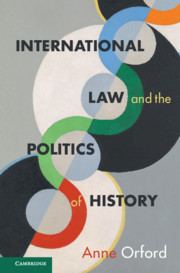Book contents
- International Law and the Politics of History
- International Law and the Politics of History
- Copyright page
- Contents
- Acknowledgements
- 1 Neoformalism and the Turn to History in International Law
- 2 Situating the Turn to History in International Law
- 3 History and the Turn to the International
- 4 History’s Lawyers
- 5 The Past in the Practice of International Law
- 6 The History of What?
- 7 Why Study the Past of International Law?
- Bibliography
- Index
2 - Situating the Turn to History in International Law
Published online by Cambridge University Press: 18 June 2021
- International Law and the Politics of History
- International Law and the Politics of History
- Copyright page
- Contents
- Acknowledgements
- 1 Neoformalism and the Turn to History in International Law
- 2 Situating the Turn to History in International Law
- 3 History and the Turn to the International
- 4 History’s Lawyers
- 5 The Past in the Practice of International Law
- 6 The History of What?
- 7 Why Study the Past of International Law?
- Bibliography
- Index
Summary
This chapter explores the political, social, and economic conditions that have shaped the turn to history since the 1990s. Those conditions include the break-up of the Soviet Union and the ‘end of history’ narrative that accompanied a decade of ambitious liberal expansionism, the crisis of liberal internationalism triggered by the war on terror and the financial, energy, food, asylum, and climate crises of the early twenty-first century, and the shift in geopolitics caused by the rise of the BRICS and particularly of China as an economic power. International lawyers in practice and the academy have drawn on past events, practices, records, and cases as argumentative resources in adjudicatory settings and in broader debates over how to understand, justify, or resist the transformation of international law. The turn to history eventually began to be understood as a project that should be distanced from the argumentative practice of international law and measured against the empiricist protocols of academic historians. This chapter returns it to the context of international legal argumentation from which it arose, in order to gain a better understanding of the turn to history as an intervention in present struggles over the meaning of international law.
Keywords
- Type
- Chapter
- Information
- International Law and the Politics of History , pp. 18 - 69Publisher: Cambridge University PressPrint publication year: 2021



